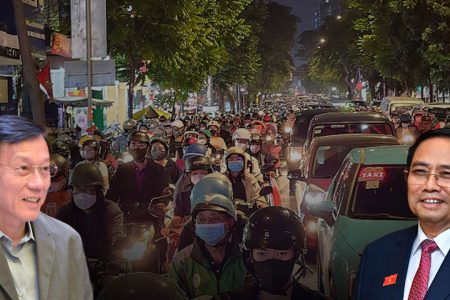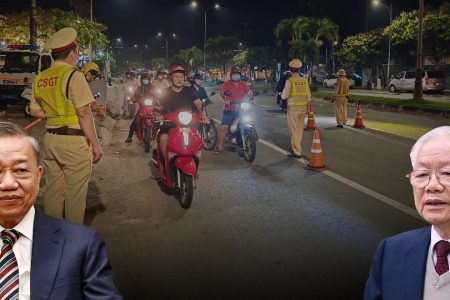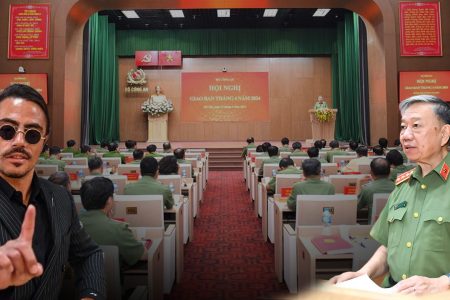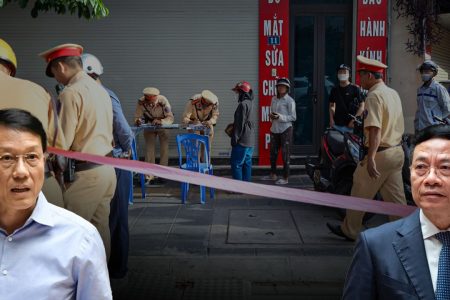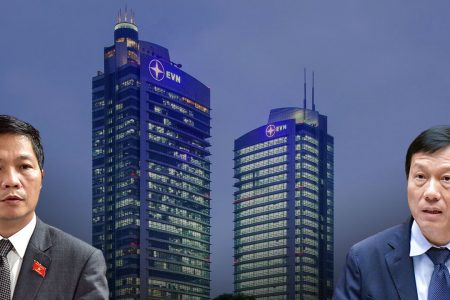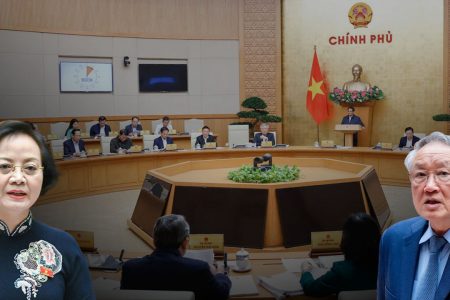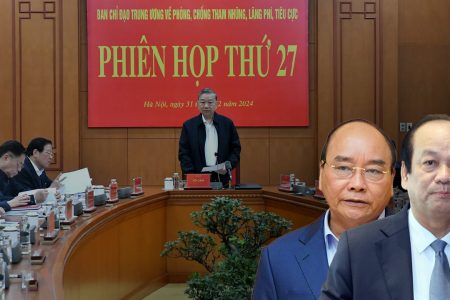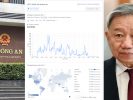
When analyzing the slogan of the Vietnamese police “protecting the party means we protect ourselves,” for a long time, Mr. Doan Hung Quoc, Chairman of the Vietnamese Studies Department at Victoria University (Australia) pointed out two fundamental errors in social organizational principles in Vietnam. First, it is contrary to the nature of the police, which in every country has, first of all, to protect the law, to protect social order, and to protect the people. Perhaps nowhere (except in authoritarian countries) the police have identified themselves with the ruling party and declared bluntly that they “protect the ruling party only.” The second mistake is that slogan is contrary to the essence of democracy, which is built on the independence of the media, the judiciary, the army, and the police. As for the police, in a democratic society, it must be under the control of elected officials, not any party.
Corruption is like mushrooms after the rain
But hey, talking about democracy with totalitarian regimes is futile. The reason is to repeat the two fundamental errors on the above-mentioned principles of social organization to “add” a third, equally serious wrong, which is the anti-corruption “unlike anyone else” in Vietnam today. The institution is the main reason for the officials in the government to exploit freely and since then, corruption in Vietnam has blossomed like a forest mushroom growing after the rain. From that, it can be inferred that fighting corruption in a one-party, totalitarian regime is completely impossible. Most recently, Dr. Pham Quy Tho has just had a fairly complete analysis of the correlation between profiteering and corruption in the totalitarian regime through the article “Corruption officials expose serious nature of political recession” on RFA on July 9, 2022. Of the many types and objects of profiteering, the self-seeking behavior of officials is the worst, always leading to corruption, that is, taking advantage of positions and powers to directly or indirectly appropriate people’s property. The reality of corruption is exposing the serious deterioration of officials’ ideology, morality, and lifestyle. Instead of performing their duties and responsibilities and complying with the law and state policies, officials violated and abused their power for personal gain. In 10 years (2012-2022), the Communist Party of Vietnam’s anti-corruption efforts has more than 19,546 cases with 33,868 officials being prosecuted and investigated, mostly for corruption, position, and economic crimes. Which, there are 170 high-ranking cadres, including 33 members, former members of the party’s Central Committee, and more than 50 generals in the armed forces- police and army.
Recently, on July 12, 2022, the Military Court of Military Region 7 opened a first-instance court hearing the case of smuggling, accepting bribes, and organizing others to illegally flee abroad. 11 people were prosecuted for accepting bribes, including Colonel Pham Van Tren – former commander of the Border Guard in Tra Vinh province, and Colonel Nguyen Van Hung – former head of Truong Long Hoa border gate guard post (province) Tra Vinh), Mr. Le Van Phuong – former deputy head of Traffic Police Department of Tra Vinh Province Police… From March 2020 to February 2021, Phan Thanh Huu, a director of a private firm, and their accomplices smuggled nearly 200 million liters of gasoline, worth about VND2.9 trillion ($130 million). From March 2020 to December 2020, Huu gave Hung a total of VND5 billion. In which, Huu Chi bribed Hung nearly VND1.7 billion, including Mr. Tren- VND1 billion, Mr. Phuong- VND360 million. Thus, the total amount of money Nguyen Van Hung received in bribes from Phan Thanh Huu from September 2020 to December 2020 is VND8 billion. Except for the amount handed over to others, Hung personally got VND6.3 billion.
Previously, on July 11, 2022, the Ministry of Public Security had just finished the investigation and requested the Supreme People’s Procuracy to prosecute Bui Trung Kien (born in 1980, former officer of Division 6, Economic Crimes Investigation Police Department for the crime of “fraudulent appropriation of property.” In this case, it is worth noting the path of the bribe brokerage amount of $1.5 million. According to the conclusion of the investigation, in 2021, Nguyen Minh Quan (Director of Thu Duc Hospital) was investigated by the Ministry of Public Security for acts of violating regulations on bidding, causing serious consequences. Afraid of being arrested, Mr. Quan asked Mr. Kien for help. Mr. Kien accepted and asked Mr. Quan to give the initial cost of $700,000. Mr. Quan has given this amount of money. After that, Mr. Quan asked Mr. Kien to take care of Mr. Nguyen Van Loi (Director of a company that won many bidding packages at Thu Duc Hospital) from being prosecuted for criminal liability. Mr. Kien asked Mr. Quan to give him another $1.5 million. In total, Mr. Kien received $2.2 million from Quan.
As for that institution, there is still corruption
Although the state of corruption in Vietnam has improved by more than 30 places over the past decade on the corruption perception index, Vietnam is still ranked 87th out of 180 countries in the world. According to Bloomberg, the anti-corruption furnace seems to be rekindled as Vietnam seeks to strengthen its appeal as a destination for foreign investment. The Communist Party’s head’s remarks came amid increased arrests of high-ranking cadres by Vietnam, including Hanoi Chairman Chu Ngoc Anh and Health Minister Nguyen Thanh Long, former Deputy Minister of Science and Technology Pham Cong Tac, and a series of generals from the Coast Guard. Mr. Trong also requested the authorities to effectively control the assets and income of those in positions of power, step up education and propaganda work, and contribute to the fight against corruption to regain people’s beliefs in the regime. Trong also ordered to “refute false claims of evil, hostile and opposing forces that the fight against corruption and handling of wrongdoing cadres and party members is an “internal struggle.”
The trial of the Coast Guard and Border Guard generals is the latest in the current anti-corruption campaign. The head of the Communist Party of Vietnam on June 30 said that more than 7,000 party members have been disciplined for corruption in the past 10 years and reiterated that there is “anti-corruption with no exceptions” when this evil is “one of the threatens the regime’s very existence.” However, according to observers, Trong’s so-called “burning furnace” campaign was largely aimed at the internal purging of factions within the Communist Party. Just take a look at the current anti-corruption movement, it shows that from ministers to deputy ministers, police generals, army generals, navy admirals, general directors of banks, provincial party secretaries, chairmen of the People’s Committee, district party committees, commune party committees were imprisoned shows how cancerous and rotten the ruling system in Vietnam is.
There is an old saying that “The house leaks from the roof.” The country’s discord is not because of the people first, but only because the “king” is confused and obscuring, the mandarins are embezzled and plundered. In a country where the “king” is intelligent, with hundreds of integrity officials, how can the country be divided? In addition, the country’s failure is because there is no talent or there is a talent that does not know how to use it. When there are talents, the country develops and faces the five continents and four seas. In the past, Dao Duy Tu was not respected by Lord Trinh who ruled the northern part, so he went to the South, Lord Nguyen knew this was a miracle, so he gave him a high position and in turn, the newcomer helped him build his great regime in the South. Today, when the CPV is in power, it appoints its members to important positions in the government. Even appointing Supreme Court justices choose people with their party’s stance. However, putting the incompetent “princelings” in important positions in the government will destroy the country. The two biggest cases today (Viet A and the Consular Department) hit two particularly sensitive areas: public health and welfare. Other cases of corruption thrive in the “murky space,” where public officials and private equity take advantage of illegal profit-sharing through stock manipulation, the conversion of farmland, and business to commercial use or payback for procurement contracts. The plane ticket and repatriation fraud scandal that directly exploits the pandemic-induced fear of ordinary citizens is too barbaric. When two ministers and a deputy minister activated the plan for a COVID test kit to be disqualified from the Communist Party, it was big news and the people cheered. Not many people feel sympathy for the Deputy Minister of Foreign Affairs, instead of taking on the position of ambassador to Japan, he was probed for corruption.
On July 8, 2022, under the chairmanship of General Secretary Nguyen Phu Trong, the Politburo and Secretariat had a meeting to consider outstanding issues of the country in the first six months of 2022, and at the same time set forth the tasks of the Party and State service for the future. The Politburo requested to speed up the investigation, prosecution, and trial of cases, especially the Viet A, FLC, Tan Hoang Minh cases, the cases at the Consular Department, AIC International Progress Joint Stock Company. .. More than half a year earlier, on January 20, 2022, in Hanoi, the same Steering Committee held the 21st meeting to review and evaluate the results of activities in 2021 and give opinions on the work schedule in 2022. At the meeting, Mr. Trong’s exhortation “must focus on directing the handling of cases...” was just a foreshadowing of the call more than half a year later. This fact proves the “corruption everywhere” which is in fact the public acknowledgment of the failure of the “burning furnace” campaigns. It was a foregone failure. Because Mr. Trong was “misdiagnosed” as the root cause of “Vietnamese disease.” The steering committee “diagnoses” corrupt cadres because they are “morally degraded“, greedy, and have lost their “revolutionary substance.” This way of fighting corruption by virtue has been opposed by many opinions in society and considered as misleading. From the outside looking in, international observers all consider corruption in Vietnam to be institutional, a product of the very way the state is organized, with too much power given to the Communist Party without the separation of powers and free press to monitor. In short, corruption in Vietnam is the product of the regime.
Thoibao.de (Translated)







